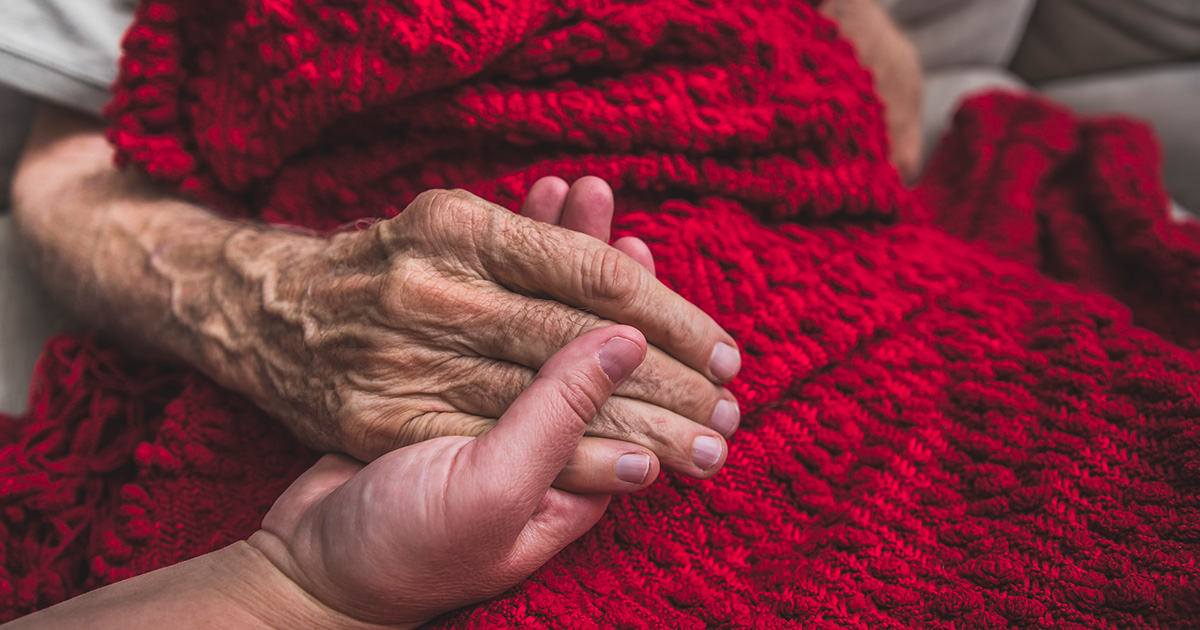
When a loved one enters a hospice program to receive end-of-life care, families face many concerns ensuring their loved one receives the best possible medication management. The fear of pain and discomfort is always at the forefront in the minds of family members as they want to do everything in their power to ensure a peaceful and comfortable experience for their loved ones.
A compounding pharmacy for hospice can develop customized medication programs for patients, which can help make this difficult time a little bit easier. By better understanding the patient’s specific needs and preferences, a compounding pharmacist can work with the hospice staff to create a medication regimen tailored specifically for the patient, increasing comfort and reducing the risk of side effects.
What Are Some Best Practices for Managing a Hospice Experience?
Anyone who has a loved one in hospice can attest to the importance of having a good support system. [1]Carlson, M. D., Morrison, R. S., Holford, T. R., & Bradley, E. H. (2007). Hospice care: what services do patients and their families receive?. Health services research, 42(4), 1672–1690. … Continue readingMany things need to be considered when caring for a loved one in the final stages of life, and it can be overwhelming for family members who are not used to providing this type of care. The best way to ensure that the hospice experience is as positive as possible is to develop a plan and enlist the help of your support network.
A Safe and Comfortable Environment
One of the most important things for a hospice patient is to feel safe and comfortable. This may mean making changes to the home, such as removing sharp objects, installing grab bars in the bathroom, or setting up a comfortable place for them to sleep.
Family Support

Families often need to take turns providing care for their loved ones, and it is important to have a support system in place to help with this. This can include friends, family members, or professionals such as home health aides. [2]Oechsle K. (2019). Current Advances in Palliative & Hospice Care: Problems and Needs of Relatives and Family Caregivers During Palliative and Hospice Care-An Overview of Current Literature. … Continue reading
Dietary Needs
Hospice patients may have special dietary needs, such as avoiding certain foods, getting certain nutrients, or drinking liquids at specific times. [3]Carter, A. N. (2020). To What Extent Does Clinically Assisted Nutrition and Hydration Have a Role in the Care of Dying People? Journal of Palliative Care, 35(4), 209–216. … Continue readingIt is important to make sure that these needs are accommodated.
Managing Pain and Symptoms
One of the main goals of hospice care is to manage pain and other symptoms. This may include therapies, dietary changes, and customized medication plans from a compounding pharmacy for hospice.
A Focus on Spirituality
Many hospice patients find comfort in spiritual activities such as prayer or meditation. It is important to include these things in the patient’s care plan if it’s something they are interested in.
By taking the time to develop a plan and enlisting the help of your support network, you can ensure that your loved one has a peaceful and comfortable hospice experience.
How Can I Best Support a Loved One in Hospice?

Without a doubt, being with someone as they become aware of their mortality is one of the most difficult things a person can go through. Hospice care provides support for both the patient and their loved ones in this difficult time, but it can be hard to know what you can do to help while dealing with your own emotions. [4]Anandarajah, G., Mennillo, H. A., Rachu, G., Harder, T., & Ghosh, J. (2019). Lifestyle Medicine Interventions in Patients With Advanced Disease Receiving Palliative or Hospice Care. American … Continue reading
-
Be there for them
One of the most important things you can do for your loved one is to be there for them. This means being available to talk when they want to and providing practical support such as running errands or helping with household tasks.
-
Allow them to talk about their feelings
Many people in hospice care are struggling with a range of emotions, and it is important to allow them to talk about these feelings and offer support and understanding. [5]Shalev, A., Phongtankuel, V., Kozlov, E., Shen, M. J., Adelman, R. D., & Reid, M. C. (2018). Awareness and Misperceptions of Hospice and Palliative Care: A Population-Based Survey Study. The … Continue reading
-
Respect their wishes
Each hospice patient is unique and will have their own wishes for their care. It is important to respect these wishes, even if they are different from your own.
-
Be patient
The process of death and dying can be slow and difficult for both the patient and their loved ones. Be patient and allow them the time they need to come to terms with their illness.
-
Make sure they have access to a hospice nurse
A hospice nurse can provide your loved one with care and support during their final days.
-
Make sure they have access to a compounding pharmacist
A compounding pharmacist can develop a customized medication program for your loved one that will provide them with relief from their symptoms.
Following these tips will help you provide them with the support they need during this difficult time and ensure their final days are as comfortable as possible.
What Are Compounded Medicines?
Compounded medicines are medications that are specially tailored to meet the needs of each individual patient. [6]Watson, C. J., Whitledge, J. D., Siani, A. M., & Burns, M. M. (2021). Pharmaceutical Compounding: a History, Regulatory Overview, and Systematic Review of Compounding Errors. Journal of medical … Continue readingThis may include adjusting the dosage, changing the form of the medication, or adding additional ingredients to help with symptom relief. Compounding pharmacists are specially trained to develop customized medications for each patient, which can be helpful for hospice patients.
Some of the major benefits that compounded medicine provides include:
-
Formulations that are not commercially available
Specific formulations can be compounded for patients who are unable to take commercially available medications. [7]Taylor, S., Hays, C., & Glass, B. (2018). Compounding medications in a rural setting: an interprofessional perspective. Journal of multidisciplinary healthcare, 11, 197–204. … Continue readingThis includes adjusting the dosage, changing the form of the medication, or adding additional ingredients to help with symptom relief.
-
Faster absorption
When medications are compounded into a specific form, it can help to speed up the absorption process. This can be helpful for patients who have difficulty swallowing or who need to take medication on an empty stomach. [8]Bushra, R., Aslam, N., & Khan, A. Y. (2011). Food-drug interactions. Oman medical journal, 26(2), 77–83. https://doi.org/10.5001/omj.2011.21
-
Reduced side effects
By compounding medications to meet each patient’s specific needs, side effects can often be reduced. This is especially important for hospice patients who are already dealing with a number of health issues at once.
-
Customized dosages
Many hospice patients have unique dosage needs, which can be difficult to meet with commercially available medications. Compounded medications can be customized down to the exact milligram to ensure that the patient receives the right dose without fear of taking too much.
-
Unique forms
Compounded medications can be ingested in a variety of unique forms, such as lollipops, gummy bears, and sublingual tablets. This can be helpful for patients who have difficulty swallowing pills or who want to avoid the taste of medications. [9]Mennella, J. A., Spector, A. C., Reed, D. R., & Coldwell, S. E. (2013). The bad taste of medicines: overview of basic research on bitter taste. Clinical therapeutics, 35(8), 1225–1246. … Continue reading
-
Adding flavors
Compounded medications can also be flavored to make them more palatable for patients. This is especially helpful for young children or elderly patients who may have difficulty dealing with the taste of medications.
-
Multiple medications in a single dose
Some patients require multiple medications to manage their symptoms. Compounding pharmacists can combine these medicationsinto a single dose, which can be more convenient for the patient, who then does not have to take multiple pills throughout the day. Compounded medicines can be an important part of a hospice patient’s care plan, and it is important to work with a compounding pharmacist who has experience in this area. If you have a loved one in hospice care, talk to your pharmacist about the possibility of using compounded medicines.
The Problem With Traditional, Un-compounded Medicine
When it comes to hospice care, many patients find that traditional, un-compounded medications are not able to provide the relief they need. This is due to a variety of reasons, such as the unique needs of hospice patients or the way that traditional medications interact with other medications the patient is taking.
In some cases, traditional medications may even cause more problems than they solve. This is especially common in elderly patients who are taking multiple medications for a variety of health issues. The combination of medications can lead to side effects that are difficult to manage.
This includes:
-
Uncomfortable side effects
Traditional medications can often cause uncomfortable side effects, such as nausea, vomiting, and diarrhea. This can be a major problem for hospice patients who are already dealing with a number of health issues. [10]Loke, Y. K., Golder, S. P., & Vandenbroucke, J. P. (2011). Comprehensive evaluations of the adverse effects of drugs: importance of appropriate study selection and data sources. Therapeutic … Continue reading
-
Interactions with other medications
Traditional medications can also interact with other medications the patient is taking, which can lead to serious health complications. This is a particular concern for hospice patients who are on multiple medications for a variety of conditions.
-
Inability to take medication
Some hospice patients are unable to take traditional medications due to their health condition or the way the medication is absorbed. This can leave the patient without any relief from their symptoms.
Compounding Pharmacy of America for Hospice Care Excellence
We specialize in developing customized medication programs for hospice patients, and our experienced team of pharmacists can provide them with relief from their symptoms. We understand that each hospice patient is unique, and we will work with you to develop a medication program that meets their specific needs.
We are committed to providing the highest quality of care to our hospice patients, and we are dedicated to ensuring their final days are as comfortable as possible. For more information about our services, please contact us today.
Chief Operating Officer, The Compounding Pharmacy of America
Matthew Poteet, Pharm.D. graduated with Honors from Lee University with a Bachelors of Science in Biological Science. After his undergraduate training, he completed the Doctor of Pharmacy program at Mercer University Southern School of Pharmacy, graduating in 2004. Dr. Poteet has spent much of his pharmacy career on staff at two of the most prestigious academic teaching hospitals in the Southeast; Emory University in Atlanta and Vanderbilt University Medical Center in Nashville. At these institutions he received extensive experience and training in sterile products compounding.
He returned home to East Tennessee in 2010, where he has held the position of Pharmacy Director at two sterile products pharmacies in Knoxville. Matthew lives in Knoxville with his wife, Chris. Dr. Poteet is Tennessee’s first Board Certified Anti-Aging Pharmacist by the American Academy of Anti-Aging Medicine.
Sources:
| ↑1 | Carlson, M. D., Morrison, R. S., Holford, T. R., & Bradley, E. H. (2007). Hospice care: what services do patients and their families receive?. Health services research, 42(4), 1672–1690. https://doi.org/10.1111/j.1475-6773.2006.00685.x |
|---|---|
| ↑2 | Oechsle K. (2019). Current Advances in Palliative & Hospice Care: Problems and Needs of Relatives and Family Caregivers During Palliative and Hospice Care-An Overview of Current Literature. Medical sciences (Basel, Switzerland), 7(3), 43. https://doi.org/10.3390/medsci7030043 |
| ↑3 | Carter, A. N. (2020). To What Extent Does Clinically Assisted Nutrition and Hydration Have a Role in the Care of Dying People? Journal of Palliative Care, 35(4), 209–216. https://doi.org/10.1177/0825859720907426 |
| ↑4 | Anandarajah, G., Mennillo, H. A., Rachu, G., Harder, T., & Ghosh, J. (2019). Lifestyle Medicine Interventions in Patients With Advanced Disease Receiving Palliative or Hospice Care. American journal of lifestyle medicine, 14(3), 243–257. https://doi.org/10.1177/1559827619830049 |
| ↑5 | Shalev, A., Phongtankuel, V., Kozlov, E., Shen, M. J., Adelman, R. D., & Reid, M. C. (2018). Awareness and Misperceptions of Hospice and Palliative Care: A Population-Based Survey Study. The American journal of hospice & palliative care, 35(3), 431–439. https://doi.org/10.1177/1049909117715215 |
| ↑6 | Watson, C. J., Whitledge, J. D., Siani, A. M., & Burns, M. M. (2021). Pharmaceutical Compounding: a History, Regulatory Overview, and Systematic Review of Compounding Errors. Journal of medical toxicology : official journal of the American College of Medical Toxicology, 17(2), 197–217. https://doi.org/10.1007/s13181-020-00814-3 |
| ↑7 | Taylor, S., Hays, C., & Glass, B. (2018). Compounding medications in a rural setting: an interprofessional perspective. Journal of multidisciplinary healthcare, 11, 197–204. https://doi.org/10.2147/JMDH.S156161 |
| ↑8 | Bushra, R., Aslam, N., & Khan, A. Y. (2011). Food-drug interactions. Oman medical journal, 26(2), 77–83. https://doi.org/10.5001/omj.2011.21 |
| ↑9 | Mennella, J. A., Spector, A. C., Reed, D. R., & Coldwell, S. E. (2013). The bad taste of medicines: overview of basic research on bitter taste. Clinical therapeutics, 35(8), 1225–1246. https://doi.org/10.1016/j.clinthera.2013.06.007 |
| ↑10 | Loke, Y. K., Golder, S. P., & Vandenbroucke, J. P. (2011). Comprehensive evaluations of the adverse effects of drugs: importance of appropriate study selection and data sources. Therapeutic advances in drug safety, 2(2), 59–68. https://doi.org/10.1177/2042098611401129 |
 Subscribe to Our Newsletter
Subscribe to Our Newsletter


